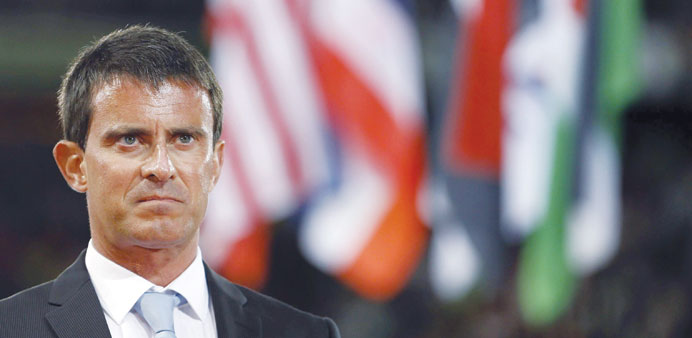By Clare Byrne/Paris/DPA
French media described Prime Minister Manuel Valls as “a man in hurry” when the ambitious former interior minister was named premier in March.
Valls had only been a minister for two years when President Francois Hollande made him head of government, replacing the mild-mannered Jean-Marc Ayrault, whose administration had been plagued by ministerial gaffes and discord.
Spanish-born Valls was France’s most popular minister at the time, with an air of authority that eluded both Ayrault and Hollande. He had the approval ratings to match.
The tough-talking former top cop laid it on the line from the start.
“If you don’t agree with the strategy, you do something else,” 52-year-old Valls warned his ministers shortly after taking office.
But he also made overtures to his critics in the left wing of the Socialist Party, including Arnaud Montebourg, a megaphone critic of globalisation and Europe, who is at the opposite end of the Socialist spectrum from the “socioliberal” Valls.
By making Montebourg his economy minister, Valls hoped to disarm him.
What he got instead was a ticking time-bomb.
As the months passed without any sign of the economy growing or adding jobs, Montebourg became a reluctant salesman for Hollande’s new pro-business policies.
Then, in July, he stuck a toe in dissident waters by calling for Hollande to dilute a plan to slash employer payroll taxes and give more money to households instead.
When that foray went unpunished, he became bolder, going as far as to demand a “major inflection” in government policy at a weekend meeting with party rebels.
Coming a few days after Hollande had vowed not to be swayed from his course, Montebourg’s remarks were seen as a provocation.
A furious Valls, who has watched his approval rating fall 12 points to 34% since becoming premier, declared the minister had “crossed a yellow line”.
Faced with the prospect of the revolt spreading, after Education Minister Benoit Hamon joined Montebourg’s protest, Hollande and Valls sensationally dissolved the entire government. A new line-up was announced yesterday.
For Bruno Cautres, a political analyst at the Centre for Political Research at Sciences Po university, the president and premier had “no choice but to demonstrate executive authority”.
“They couldn’t afford a return to the functioning of Ayrault’s government, where the prime minister said one thing and the ministers another,” Cautres told DPA.
But in doing so, they risk alienating disgruntled leftists. Dozens of Socialists legislators have abstained during recent votes on economic legislation. Stung by the Valls-Hollande crackdown on dissenters, they could change their stance from abstention to outright rejection.
It will fall to Valls to win them round and save Hollande from having to use the “nuclear option” of dissolving parliament and calling snap elections, which the Socialists would certainly lose.
One of the first tests for Valls will come when he delivers the policy speech that incoming - and returning - prime ministers are required to give in parliament.
Valls submitted his last such speech in April to a vote of confidence, despite not being compelled to hold a ballot.
“The French are watching us. They expect a lot of us,” he said in an impassioned address, which was approved by 306 out of 571 parliamentarians.
This time Valls may decide not to tempt fate.

Prime Minister Manuel Valls: he has watched his approval rating fall 12 points to 34% since becoming premier.
